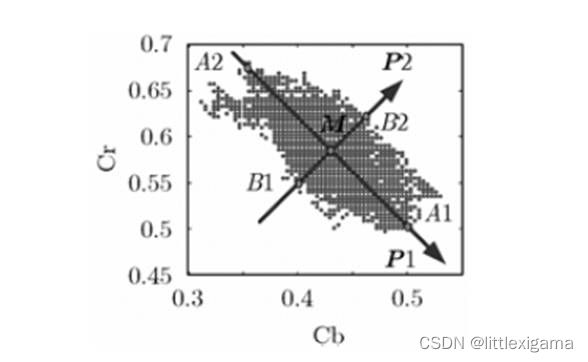opencv基于ycrcb的皮肤检测(改进版)
椭圆肤色检测模型
原理:将RGB图像转换到YCRCB空间,肤色像素点会聚集到一个椭圆区域。先定义一个椭圆模型,然后将每个RGB像素点转换到YCRCB空间比对是否再椭圆区域,是的话判断为皮肤。
圆心在(113,155),长半轴23,短半轴15,代码如下
import numpy as np
skin_crcb_hist=np.zeros((256,256),dtype=np.uint8)
cv2.ellipse(skin_crcb_hist,(113,155),(23,15),43,0,360,(255,255,255),-1)我原先这么写的,对每个像素的cr,cb像素判断是否在椭圆内,若在则在二值图像该位置设为255,否则仍为0。
import numpy as np
import time
def get_skin(img):
start=time.time()
ycrcb_img=np.empty(img.shape)
Binary=np.zeros(img.shape,dtype=np.uint8)
ycrcb_img=cv2.cvtColor(img,cv2.COLOR_BGR2YCrCb)
y,cr,cb=cv2.split(ycrcb_img)#通道分离
for i in range(img.shape[0]):
for j in range(img.shape[1]):
if skin_crcb_hist[cr[i,j],cb[i,j]]>0:#逐像素检测
Binary[i,j,:]=255,255,255
Binary_oppo=cv2.bitwise_not(Binary)
img_hand=cv2.bitwise_and(img,Binary)
img_hand=cv2.bitwise_or(img_hand,Binary_oppo)
contours,_=cv2.findContours(Binary[:,:,0],mode=cv2.RETR_EXTERNAL,method=cv2.CHAIN_APPROX_SIMPLE)
if len(contours)==0:
return None
cnt=-1
for i in range(len(contours)-1,-1,-1):
area=cv2.contourArea(contours[i])
if area>80*80:
cnt=i
break
if cnt==-1:
return None
x,y,w,h=cv2.boundingRect(contours[cnt])
print("time cost:",end-time.time())
cv2.imshow("hand_inner",img_hand)
cv2.imshow("environment",img)
cv2.waitkey(0)
return img_hand[y:y+h,x:x+w]
运行时间如图所示
numpy.where()功能非常强大且迅速,改进代码
import numpy as np
import time
def get_skin(img):
start=time.time()
ycrcb_img=np.empty(img.shape)
Binary=np.zeros(img.shape,dtype=np.uint8)
ycrcb_img=cv2.cvtColor(img,cv2.COLOR_BGR2YCrCb)
y,cr,cb=cv2.split(ycrcb_img)#通道分离
a,b=np.where(skin_crcb_hist[cr,cb]>0)#修改部分,用np.where()代替逐像素判定修改
Binary[a,b]=255
Binary_oppo=cv2.bitwise_not(Binary)
img_hand=cv2.bitwise_and(img,Binary)
img_hand=cv2.bitwise_or(img_hand,Binary_oppo)
contours,_=cv2.findContours(Binary[:,:,0],mode=cv2.RETR_EXTERNAL,method=cv2.CHAIN_APPROX_SIMPLE)
if len(contours)==0:
return None
cnt=-1
for i in range(len(contours)-1,-1,-1):
area=cv2.contourArea(contours[i])
if area>80*80:
cnt=i
break
if cnt==-1:
return None
x,y,w,h=cv2.boundingRect(contours[cnt])
print("time cost:",end-time.time())
cv2.imshow("hand_inner",img_hand)
cv2.imshow("environment",img)
cv2.waitkey(0)
return img_hand[y:y+h,x:x+w]
速度提升了224倍!


